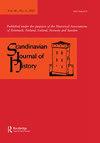芬兰内战前累积的挫折和社会信任的侵蚀
IF 0.8
3区 历史学
Q1 HISTORY
引用次数: 0
摘要
1918年的芬兰内战被描述为俄罗斯帝国崩溃后留下的权力真空中的一场期望革命。最近,它被描述为民主国家的布尔什维克革命。从芬兰社会民主党的角度来看,重建红卫兵和寻求布尔什维克的支持是为了防止资产阶级反革命。他们在废除赋予议会主权的法案和解散社会党占多数的议会中看到了明显的威胁。本文追溯了社会主义者对资产阶级不信任的根源,包括劳资关系、土地改革辩论和战时食品监管。与瑞典不同,芬兰不承认集体协议。在心态上,土地所有者和依附他们的仆从之间的分歧仍在继续。由于农村人口过剩,在19世纪几乎没有社会流动性。社会地位变得至关重要,重新分配土地的倡议被地主阶级推迟了。就像在俄罗斯一样,没有土地的人和产业工人开始有了共同的阶级意识。他们开始把自己的不满指向政府,因为他们认为政府代表着私人利益。本文章由计算机程序翻译,如有差异,请以英文原文为准。
Cumulative Frustrations and the Erosion of Social Trust before the Finnish Civil War
ABSTRACT The Finnish Civil War of 1918 has been described as a revolution of expectations in the power vacuum left by the collapse of the Russian Empire. More recently, it has been described as an attempted Bolshevik revolution in a democracy. From the perspective of the Finnish Social Democrats, the re-establishment of the Red Guards and seeking support from the Bolsheviks were aimed at preventing a bourgeois counter-revolution. They saw a clear threat of that in the repeal of the act granting parliamentary sovereignty and the dissolution of the socialist-majority Parliament. This article tracks the origins of the socialists’ mistrust of the bourgeoisie through industrial relations, land-reform debates and war-time food regulation. Unlike in Sweden, collective agreements were not recognized in Finland. In the mentalities, the divide between landowning individuals and their dependent servants continued. Due to rural overpopulation, there had been little social mobility in the 19th century. Social positions had become essentialized, and initiatives to redistribute land had been postponed by the landowning classes. As in Russia, landless people and industrial workers came to share a class consciousness. They began to direct their frustrations at the state, which they saw as representing private interests.
求助全文
通过发布文献求助,成功后即可免费获取论文全文。
去求助
来源期刊

SCANDINAVIAN JOURNAL OF HISTORY
HISTORY-
CiteScore
1.10
自引率
20.00%
发文量
33
期刊介绍:
Scandinavian Journal of History presents articles on Scandinavian history and review essays surveying themes in recent Scandinavian historical research. It concentrates on perspectives of national historical particularities and important long-term and short-term developments. The editorial policy gives particular priority to Scandinavian topics and to efforts of placing Scandinavian developments into a larger context. Studies explicitly comparing Scandinavian processes and phenomena to those in other parts of the world are therefore regarded as particularly important. In addition to publishing articles and review essays, the journal includes short book reviews. Review essay proposals and polemical communications are welcomed.
 求助内容:
求助内容: 应助结果提醒方式:
应助结果提醒方式:


